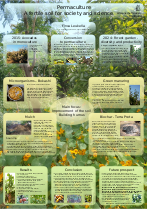Juli 09 2024
Permaculture – a fertile soil for society and science

here as .svg
From 26. to 28. June 2024 we took part in the 10th Living Knowlegde conference at the University of Girona (Spain), where we presented our permaculture project. If you click on the poster image, you can download a higher resolution image (PNG, 7 MiB), with readable text:-) Additionally you can read an earlier, more detailed text about Finca Leukeña here, and the briefer abstract submitted to the conference follows:
We report on an agricultural project (Finca Leukeña) in the far south of Spain, in which a bare, dry avocado plantation has been transformed into a fertile food forest since 2015. This transformation is guided by the principles of permaculture, which aims at PERMAnent, agriCULTURurally productive ecosystems. This includes techniques like mulching, green manure, fermentation, charcoal, terra preta. These are applicable regardless of the climate zone and, thanks to their simplicity, accessible to all gardeners.
Sustainable food production is the basis of a sustainable civilization. It is well known, at least since „The Limits to Growth“ (1972), that the (capitalist, industrial) civilization we live in is not sustainable at all. Permaculture is a tried and tested alternative to industrial agriculture, but initiatives striving to use it in order to improve the ecological situation are faced with difficult surrounding conditions:
- permanent access to land (ownership),
- bureaucratic restrictions on the reuse of biomass and the distribution of the harvest,
- dynamics of the food markets, i.e. capital concentration in ownership, production, processing and distribution,
- dominance of the mineral fertilizer theory of plant nutrition in science.
Despite the problems, many experiments using permaculture’s principles and techniques are being performed, and their results literally call for systematic support from science:
- research in the area of soil life, and of permaculture in general (microbiology, botany, ecology, geography, anthropolgy, …),
- systematizing the knowledge gained by practitioners and making it available to multipliers and the general population,
- field studies, done especially by younger people (living and working with and within nature provides a deeper understanding of its complexity (and beauty), an experience of practical, social impact along their scientific activity, and a solid foundation for their vision of a sustainable society).
There are movements and organizations in society that implement co-operative and ecologically oriented modes of agriculture, like CSA (community supported agriculture) and biological farming. Permaculture is able to extend their approaches, e.g. to improve bio-diversity and climate mitigation/protection.
Kommentare deaktiviert für Permaculture – a fertile soil for society and science